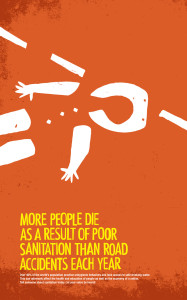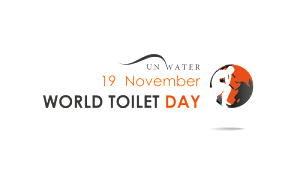
The lack of adequate sanitation facilities accounts for 4,100 preventable deaths every day.
Credit: Kofi Opoku, West Virginia University
With our Energy and Water Summit right around the corner, we’ve only got one thing on our mind: poop.
Forty percent of the world’s population – 2.5 billion people – practice open defecation or lack adequate sanitation facilities, and the consequences can be devastating for human health as well as the environment.
The Electrochemical Society and the Bill & Melinda Gates Foundation know there is no easy solution to this problem, but we are dedicated to finding and funding innovative research to reinvent the sanitation infrastructure.
In Francis de los Reyes’ TEDTalk entitled, “Sanitation is a basic human right,” the environmental engineer and sanitation activist makes his case for the total reinvention of the sanitation landscape as we know it.
“For the past 14-years, I’ve been teaching crap,” Reyes says.
And that he has. Reyes has dedicated his time to studying and researching human waste. The problem is especially relevant in India, where open deification is putting citizens at major health risks.
This from Reuters:
Less than a third of India’s 1.2 billion people have access to sanitation and more than 186,000 children under five die every year from diarrheal diseases caused by unsafe water and poor sanitation, according to the charity WaterAid.
The United Nations said in May half of India’s people defecate outside – putting people at risk of cholera, diarrhea, dysentery, hepatitis A and typhoid.
Read the full article here.
With India accounting for 818 million of the 2.5 billion people who lack adequate sanitation, most of the country’s rivers and lakes are polluted with sewage and industrial effluents.
So why can’t we just build western style flush-toilets in countries such as India?
“It’s just not possible,” Reyes says.
In these developing worlds, there is often time not enough water or energy to take on such a feat. Also, laying out sewer lines would cost governments tens of trillions of dollars.
Through our partnership with the Bill & Melinda Gates Foundation, we hope to help solve these issues.
 Here at The Electrochemical Society, we give a crap about sanitation. With our recent partnership with the Bill & Melinda Gates Foundation – which awarded $210,000 in seed funding to innovative research projects addressing critical gaps in water and sanitation – we’ve spent a great deal of time these past few months talking about poop. We plan to keep that trend alive, which brings us to World Toilet Day.
Here at The Electrochemical Society, we give a crap about sanitation. With our recent partnership with the Bill & Melinda Gates Foundation – which awarded $210,000 in seed funding to innovative research projects addressing critical gaps in water and sanitation – we’ve spent a great deal of time these past few months talking about poop. We plan to keep that trend alive, which brings us to World Toilet Day.



